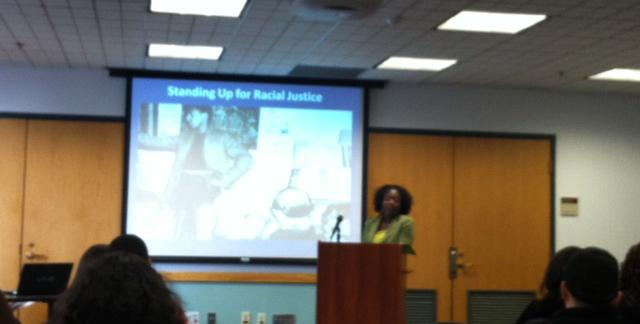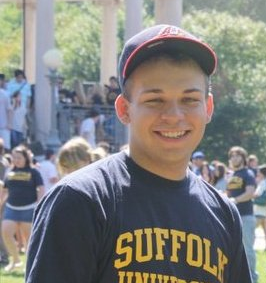Suffolk University’s Black Student Union is holding eight events in honor of Black History Month, which began Feb. 5 with the opening ceremony. The event featured Dr. Joyce McNickels, a professor at Anna Maria College, who focused the lecture on Bayard Rustin , a fighter for African-American rights from the 1940s all the way into the 1970s.
McNickels explained throughout the lecture some of Rustin’s efforts in his life to help push for civil rights laws and put the issue in the public eye as well as why she believes he has been ignored in the black history books.
Being a homosexual black man, McNickels believes “his sexual orientation is the only reason he’s stood on the margins of black history. He wasn’t the right flavor of black.”
Like Martin Luther King Jr., Rustin believed in Ghandi’s philosophy of nonviolence and was a practicing follower of the Quaker religion. He stood up for his seat on the bus before Rosa Parks started the Montgomery Bus Boycott. When asked why he wouldn’t just leave his seat and obey the segregation law, Rustin pointed to a young white boy next to him and said “If I move now, this child will not know this is injustice.”
When Rustin was drafted for war, he refused to fight overseas and went to prison instead, where he tried to de-segregate the prison he was in. Rustin was such a handful, the warden of the prison repeatedly tried to transfer him, claiming he was a “schemer” but was ultimately unable to do so.
“You think we would’ve heard about this but again these stories go untold,” McNickels said.
In addition to these acts of protest, Rustin challenged the Jim Crow laws with fellow black and white activists by taking part in Freedom Rides in 1947, 14 years before the more celebrated Freedom Rides would take place. Rustin was again arrested for his protest along with his fellow activists, where the black protestors would be sentenced to 30 days in jail. The white protestors received 90 days in jail for their actions.
When asking the crowd why they thought this distinction on jail sentences was made, McNickels joked, “Today that doesn’t happen, today we always get more time.” She then explained that the white protestors were made an example of, in an attempt to scare fellow whites from taking part in similar actions.
During his time in jail for this protest, Rustin was a member of a chain gang. He would write several articles for the New York Post after being released from his 30-day sentence on the inhumane treatment of chain gangs, which lead to the state of North Carolina eliminating chain gangs in any prison.
“Again this story goes rarely acknowledged…he’s not in history books because he was a gay man,” McNickels said.
Rustin’s 1962 debate with Malcom X over separation vs. integration for black rights, organizing of the 1963 march on Washington and his later gay rights activism was also highlighted in the lecture.
McNickels reiterated her belief that his sexual orientation is what has made Rustin a more forgotten figure in black history, believing that when fellow activists talk with historians, they overlook Rustin for the same reason.
“His story has not been told because he didn’t fit the narrow definition of ‘blackness,’” McNickels stated.




















Alex Hall • Feb 8, 2013 at 10:07 am
Black History Month Celebration Kicks Off at Suffolk http://t.co/6L0Grvgt via @SuffolkJournal
The Suffolk Journal • Feb 8, 2013 at 9:08 am
[News] Black History Month kicks off at Suffolk: http://t.co/M1Ha2OBI